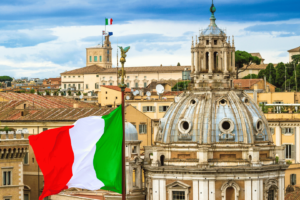The Hellenic nation of Greece is one of the most naturally stunning countries globally, as it boasts numerous islands in the Aegean flanking a diverse landscape full of history and culture.
The birthplace of democracy has come a long way, becoming a major player of the EU and a global economic and political leader.
Geography and Climate
Greece is situated at the heart of the Mediterranean, sharing borders with Albania, North Macedonia, Bulgaria, and Turkey. However, most of its landmass is surrounded by water, as the Aegean and the Adriatic seas flank the nation, while the Mediterranean opens the rest of the world to Greek trade and travel.
In Greece, you are never more than 85 miles from the coast, and the majority of the population lives near the beach to enjoy Mediterranean Climate, which entails hot summers and moderate winters.
Greece is one of the globe’s major tourism magnets; as those looking for ancient ruins, fine cuisine, exciting nightlife, towering mountains, or just sunny shores will find what they are looking for in the Mediterranean nation.
Sunseekers, especially, are in for a thrill, as Greece has an abundance of sunshine all year round. The gorgeous Athens, for example, has an average temperature of 18 C, allowing both its residents and tourists to enjoy life to the fullest any time of the year.
With over 6000 islands adorning the nation’s Peloponnese, it is easy to see why the climate and geography of Greece attract millions of tourists each year, and why many of the world’s elite choose to reside in a country plastered with hues of green and blue.
History and Government System
The birthplace of democracy, Greece’s history makes for outstanding reading. The EU nation’s history is well documented, spanning more than 3000 years, from the early Minoan and Mycenaean kingdoms, the rise of Sparta and Athens, and to the towering nation, we see today.
History books are full of Greeks who changed the world; Socrates, Plato, Aristotle, and Pythagoras are just some ancient Greek visionaries who are still quoted in our modern curriculums, while modern doctors still take the Hippocratic oath, written by Hippocrates himself well before 370 BC.
Greece’s history spans so long we couldn’t possibly fit it into one book, let alone a web page, but a testament to Greece’s long-lasting effect on the world are the democratic government systems we see today, which are largely based on the system Athens used well into BC years. Even Greece’s ancient currency, the Drachma, was still the government’s official currency until it adopted the Euro in 2001.
Greece adopts a democratic framework for its government, and its status as an EU member means it falls in line with EU regulations and political alliances. The government is formed by an elected parliament, elected president, and assigned prime minister.
Greece’s Foreign Relations
The importance of Greece’s geographical location cemented its status as the heart of the known world long, long ago. To this day, the country still possesses an important strategic location and is one of the main channels connecting the west to the east. This means that Greece is inherently bound to form a plethora of foreign relations.
Its inclusion in the EU makes it an even bigger deal, as one of the largest members of the Union, Greece has strong relationships with the rest of its member states will maintaining robust relations with the US, UK, and other world-leading nations.
Its location in the middle of the Mediterranean trading routes has allowed Greece to create a vast network of trading partners, from Egypt to its south, Turkey to its east, and the Balkans to its north; Greece has one of the busiest trade routes in the world and hence one of the most intricate and complex lists of international relations.
Population and Language
Greece has a population of just over 10 million people residing throughout its various cities. One-tenth of that population are “foreign-born”, highlighting the impressive population diversity the country boasts. Athens, Thessaloniki, and Patras are the largest cities by population, housing about one-third of the nation’s residents among them.
The official and most common language in Greece is Greek, a language that has existed in a similar form for over 3000 years. You will find a high rate of multilingual people in Greece, however, due to its central global location. English, Italian, German, and French are extremely common in the nation.
Culture
Greece’s culture is formed by the meeting of the East and the West, with a rich history creating the base for a considerable number of cultural activities. Because of Greece’s history, there is a vast mix, with Roman and Ottoman occupations tendering a wide cultural variety that remains felt to this day.
Greece is famed for its food, particularly its Mediterranean diet, leading to one of the highest life expectancies in the world.
Because of the rich classical history, there are many museums from archaeological digs giving a fantastic overview of what life was like in Greek and Roman times. This cultural effect also spills into their music and theatre, which they love.
Economy and Currency
Greece’s economy is strongly linked to the EU, as it is a part of the Eurozone too, with the majority of its trade going on within those boundaries.
The economy is growing steadily and has set good monetary policy in line with the Eurozone’s averages, becoming the largest economy in the Balkans.
Shipping is a large part of the Greek economy due to its location towards the top of the Suez Canal and is sandwiched between the major regions of Europe, the MENA, and West Asia. Greece is also currently undertaking the creation of an East Mediterranean trade bloc.
Greece does focus on the services sector as well, boasting one of the best private healthcare landscapes in the world while also being a significant player in the finances and banking sector.
Manufacturing, agriculture, and real estate are also gargantuan parts of the Greek economy, while the latter was greatly boosted by the launch of Greece’s golden visa, more on that a bit later.
Conditions of Employment
To work in Greece, you need a work visa, and it has two overarching categories: a short-stay “C” visa or a longer-term “D” visa.
The short-stay visa can be used for both work and travel, making a trip there pleasurable, although it is a Schengen type visa, meaning you can stay for a total of 180 days, and it must be split into two 90-day stints.
Most likely, people will be looking for a long-term “D” visa that allows the person to enter Greece and potentially apply for a residence permit. However, Greece has a unique benefit of the combination of a work visa and a long-stay visa to be entitled to work and live in the country.
If you have EU or EEA access or a Swiss passport, you won’t need a Visa, but outside of these areas, there are complications, the good thing is, however, Greece has elegant solutions to those complications, such as the golden visa program.
Residence Permit
The Greek Golden Visa program was launched in 2013 as an offset against the Global Market crash and has been thriving since then.
The visa grants a five-year residency timespan in return for investing in Greek real estate for an amount no less than 250,000 Euros. An investor can choose from buying one or multiple properties as long as they meet the minimum investment requirement.
This visa offers no minimum stay requirement, and an investor’s spouse, dependent ascendants, and unmarried, dependent children are included (up to the age of 21) within the same application. It can be renewed every five years if the property is retained.
This residency card, which takes only 40 days to be issued, can lead to citizenship after seven years of being a tax resident of Greece.
There are other routes to a Greek Golden Visa, which are:
- A 400,000 euro investment into Greek government bonds
- A 400,000 euro investment into a mixed portfolio of Greek bonds, shares, and real estate
- A 400,000 euro deposit into a Greek bank.
- An 800,000 euro investment into a mix of corporate and government bonds
- A capital investment of 400,000 euros into a company registered in Greece
Work Permit
To work in Greece, you need a work permit. Luckily, holders of the Greek golden visa are free to take up gainful employment or undertake self-employment within the country as they see fit.
The accompanying dependents of an applicant also get the freedom to work within Greece with no limitations whatsoever.
Acquisition of Citizenship
To become a Greek citizen, you need to naturalize by residing in the country as a tax resident (six months per year) for seven consecutive years then filing a citizenship application. EU nationals, however, only need three years to do so.
At the time of applying for citizenship, you will need to have a basic understanding of the Greek language and show that you have harmonized with Greek culture. There are a few other things you will be reviewed upon including:
- An understanding of Greek history, culture, and political history
- You partake in professional activities
- You join in social activities with other Greek citizens
- If your children have attended a Greek school
- You have paid your taxes and contributions
There is also an exam called the “Panhellenic”, a written test evaluating your command of the language and knowledge of Greek history and geography. Only after you have received over 80% on the exam can you naturalize as a citizen.
If you are over 67 upon taking the exam, you can have an oral exam instead of a paper one.
It may seem a bit daunting, but becoming a Greek citizen not only grants you the benefits of the illustrious Mediterannean nation but the entirety of the EU.
Guide to Buying Real Estate in Greece
Greek real estate options are vast, as any Greek property is eligible for the golden visa, but there is a primary focus on habitable villas near the sea.
Because of this focus, the Greek government is encouraging investors to invest outside of the main cities and towns.
This diversification has led to a considerable amount of interest, with potentially cheaper properties leading to over 90% of the investments coming from overseas, leading to residency. In addition, the availability of villas has led to a huge ex-pat community, who all hold great pride in their real estate holdings in Greece.
Greek Citizenship Through Investment
While there is no direct citizenship by investment program yet, emphasis on yet, the golden visa acts as the easiest route to Greek citizenship for third-country nationals.
Reasons to Invest in Greece
The flexibility of investing in Greece is great because there are no restrictions about real estate location and type that allow you to create a diverse and lucrative portfolio.
Whether you are looking to use your new property or rent it out for a nifty ROI, Greek golden visa regulations give you the freedom to pick and choose what suits you best.
Greece is a stable country with a low cost of living, and a falling crime rate that is already lower than the UK, with violent crime and drug-related crime being particularly low, meaning your investment has even greater appreciation rates in a market that is rapidly becoming more popular.
As Greece is quickly adopting the latest technology, the opportunities to buy a smart villa that will go up in price are vast, just another reason we see more of the world’s elite invest in Greece, such as the latest uptick of British ex-pats moving post-Brexit.
Another significant benefit is becoming an EU resident, and in some instances down the road, an EU citizen; gaining all the benefits the massive European Union has to offer.
Demographic, Economic and Sector Data About Greece
Greece is about 90% ethnically Greek, with the rest being from a wide range of the world, particularly other Eastern Mediterranean states. The population is around 85% Greek Orthodox.
Greece is economically in line with the rest of Europe and has a growing GDP for over seven years in a row now, with a massive decrease in poverty being enacted over the last two decades.
In terms of education, Greece remains in the top 30 countries in the OECD, showing that it is a very good place to raise your children. There are also several international schools in Athens and Thessaloniki.
Crime remains low in Greece and is also decreasing rapidly, in line with the decreasing poverty rate.
The healthcare in Greece is one of the best in the world, ranking at number 14 globally above the likes of the UK, Switzerland, and many more.
Taxation in Greece
Income tax- Greece follows the EU taxation average closely, having a bracketed system for income tax as shown below:

Property tax- in Greece, if you are buying a new property, you may have to pay VAT in the amount of 24% unless the property can be exempted, this only applies for real estate being sold for the first time. Property transfer tax is set at 3.09%, which applies to second sale properties.
Inheritance tax- Greece also applies inheritance and gift tax in the amount of 10% for first-degree relatives, 20% for close relatives, and 40% for all others.
Capital gains tax – Greece has a flat rate of 15% for capital gains tax.
FAQ
Who is eligible for the golden visa?
Anyone over 18 who has a clean criminal record, makes a qualifying investment, holds sufficient health insurance within Greece, and submits a full application is eligible for the golden visa.
Who is eligible for Citizenship?
The requirements for Greek Citizenship after residence are pretty straightforward, as you reside as a tax resident for seven years all you need to do is submit an application with proof that you have:
- No criminal record
- No unpaid taxes in Greece
- An understanding of Greek history, culture, and political history
- Genuine, social links to the country
You can read our previous post on https://smartcitizenship.com/guides/turkish-citizenship-by-investement/





Comments: 2
Great post! We are linking to this great article on our site. Keep up the great writing.